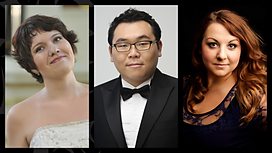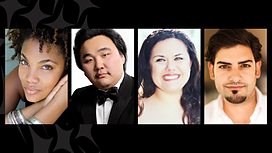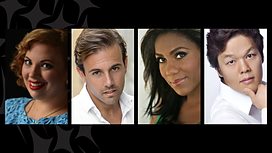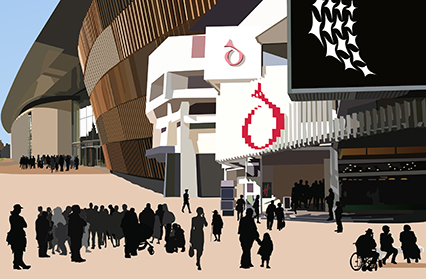Cath Barton reports on the BBC Cardiff Singer of the World 2015 Song Prize Recitals 1 – 3 of four held at the Royal Welsh College of Music Drama.
There have been a few changes to the BBC Cardiff Singer of the World Competition this time. New artistic director, David Jackson, has introduced fringe events in what he says is the hope that ‘Cardiff Singer of the World 2015 will feel more like a festival of classical singing, with a world-class competition at its heart.’
The competition rightly remains the main attraction, and there was a frisson of excitement in the air as the audience gathered in the foyer of the Royal Welsh College of Music and Drama on Sunday afternoon for the first event, Song Recital 1. Old friends greeted one another, remarking on how quickly two years had gone by, while in amongst them Llŷr Williams, one of the official accompanists, quietly ate lunch. Across the room David Jackson was in conversation with the baritone Donald Maxwell, who is this year giving pre-performance talks, and Iain Burnside was sitting at another table chatting with his guest on BBC Radio 3 for the recording of the first concert, Welsh soprano Rebecca Evans. No stuffy occasion this!
At 1.30pm the Dora Stoutzker auditorium opened and we filed in for the first of Donald Maxwell’s talks. He described his role as that of The Man in Seat L45, there to help us read, as it were, the railway timetable, and for this and the following recitals on Sunday evening and Monday afternoon he did so with wit and aplomb, feeding us information about the songs we were about to hear, opinions about the demands of particular songs on the singer and thoughts about how the programmes were constructed. What he did enhanced our listening, but he did not tell us what to think. For example, such-and-such a song, he said, required poise and control. It was for each listener to form his or her own opinion as to how far the singer achieved this.

Thus equipped, we heard in Recital 1 three singers. First on was Nadine Koutcher, a soprano from Belarus. This was a tremendous opening recital. She sang with good tone throughout her range and excellent dynamic variation. Her particular strength is in coloratura, especially well exemplified in her delivery of the Saint-Saens vocalise Le rossignol et la rose.
The second singer, tenor Jaeyoon Jung, one of three contestants from South Korea, gave a short programme of an Aria Antiche by Sarti, in which he demonstrated good vocal control, followed by three songs from A Cycle of Life by Sir Landon Ronald. Donald Maxwell had explained in his pre-performance talk that this English composer – whose principal claim to fame is to have advised Gerald Moore that he should pursue a career in music – is for some reason extremely popular in South Korea. He had also described these as Sunday afternoon songs’, but Jaeyoon Jung gave them quite a punch.
The third and final singer of the afternoon was the Welsh soprano Céline Forrest. Arguably at a disadvantage as the youngest singer in the competition, and still training, she was poised and apparently confident on stage and acquitted herself well in a varied programme which concluded with the Delibes showpiece Les Filles de Cadiz.

Recital 2 on Sunday evening showcased four singers. Soprano Lauren Michelle is one of three singers from the USA in the competition. Her programme was a reflective one, starting with Vaughan Williams’ demanding Silent Noon, in which she floated the final high note to great effect. Lauren brought a transcendental quality to the unaccompanied spiritual Over My Head, for me the highlight of her programme.
Amartuvshin Enkhbat, from Mongolia, is described as a baritone, though the resonance of his quite monumental voice is certainly that of a bass. There were times when Llŷr Williams, his ever-able accompanist, was struggling to get the singer to move forward, and it would have been good to have heard some rhythmic variation in his singing, but there is no doubting his potential.
The highlight of the programme given by Anaïs Constans, a soprano from France, was three songs from Poulenc’s Métamorphoses. These not only suited her voice perfectly, but also supplied a rare interlude of humour in these mainly too-solemn recitals.
The concert concluded with a delightful programme from Turkish tenor Ilker Arcayürek. Singing completely within the confines of his voice, never pushing or straining, he even convinced in Schubert’s Der Doppelgänger, usually associated with the colour of a lower voice, and concluded his programme with a beautiful rendition of Reynaldo Hahn’s L’heure exquise.

On Monday afternoon four further singers sang in Recital 3. Canadian soprano Aviva Fortunata opened her programme with Schubert’s well-known song Die junge Nonne, but found the character of the song better in Respighi’s Nebbie.
The tenor Nico Darmanin, from Malta, riskily sang a populist programme, including a Neopolitan song by Tosti, Ideale, and concluding with Rossini’s showpiece patter song La danza. Although he brought off the Rossini well-enough, he did not connect with the audience as well as he must have hoped.
USA mezzo J’nai Bridges presented a dramatic programme which began with a big Mahler song, Ich hab’ein glühend Messer and ended with John Carter’s Ride on King Jesus, a relentless ride for singer and pianist alike which they carried off triumphantly.
Finally, the baritone Insu Hwang, the second of the South Korean competitors, gave a programme which came to life with his rendition of Wolf’s Abscheid from his Mörike-Lieder. Vaughan Williams’ The Vagabond was a less successful choice for a singer not steeped in English song.
***
Four singers remain to sing before the five song prize finalists are selected by the jury of David Pountney, Finnish soprano Soile Isokoski (who was a finalist in Cardiff Singer in 1987), American soprano Claran McFadden, pianist Julius Drake and director of Wigmore Hall John Gilhooly. What the judges are looking for remains their secret, but clearly a recitalist needs more than just an excellent instrument – which the selection process has surely ensured that all 20 competitors have.
The recital rounds demonstrate two important things – how well a singer constructs a programme so as to show off the different facets of his or her voice, and how well he or she communicates with the audience in the relatively intimate space of the recital hall. All the singers in the first three recitals had at least one song which showed off their skills and spoke to the audience, but one song does not a recital make. And what makes a good communicator? I would say that openness, honesty and a commitment to the songs are crucial, and more important than beauty of voice, though who wouldn’t want to have both in an ideal world?!
Having only heard eleven out of 20 singers I can only suggest those amongst the eleven I would look out for as the competition progresses, be they as possible song prize finalists or potentially amongst those who will shine on the main stage. They are, in the order I heard them:
Nadine Koutcher, soprano, Belarus
Lauren Michelle, soprano, USA
Amartuvshin Enkhbat, baritone, Mongolia
Ilker Arcayürek, tenor, Turkey
Song Prize Recital 1: 2.30pm June 14 2015: Nadine Koutcher / Jaeyoon Jung / Céline Forrest
Song Prize Recital 2: 7.30pm June 14 2015: Lauren Michelle / Amartuvshin Enkhbat / Anaïs Constans / Ilker Arcayürek
Song Prize Recital 3: 2.30pm June 15 2015: Aviva Fortunata / Nico Darmanin / J’nai Bridges / Insu Hwang
Illustration by Dean Lewis



 Enjoyed this article? Support our writers directly by buying them a coffee and clicking this link.
Enjoyed this article? Support our writers directly by buying them a coffee and clicking this link.







